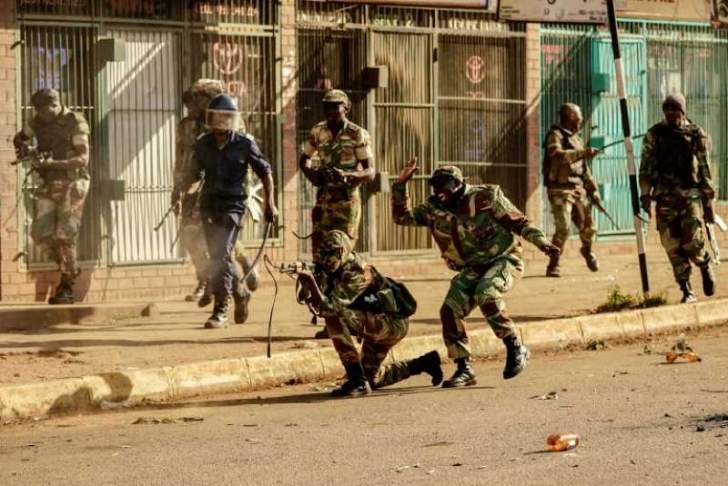MDC let down six civilians who were executed by state on 1 August 2018

BY MOSES MATENGA
ZIMBABWE on Sunday marked three years after six civilians were fatally shot by State security agents in the August 2018 post-election violence, with exiled former Zanu PF politburo member Jonathan Moyo accusing the opposition and civic society organisations (CSOs) of letting down the victims by not piling pressure on government to ensure the prosecution of the perpetrators.
The six were shot at point-blank range on August 1, 2018 as the army stepped in to help police quell the post-election protests triggered by delays in announcing 2018 presidential election results.
At least 35 others, including by-standers, sustained gunshot wounds.
A seven-member commission of inquiry led by former South African President Kgalema Motlanthe concluded that the army and police were the perpetrators and recommended that individuals involved be made to account for their actions, but three years down the line, no one has been prosecuted.
The commission also recommended compensation for the victims.
President Emmerson Mnangagwa has not honoured his pledge to implement the recommendations and ensure justice is delivered.
As the country observed the third anniversary of the brutal shootings, Moyo, who has turned a fierce critic of the Mnangagwa administration, tweeted: “The Motlanthe Commission found that only the army and police used guns on August 1, 2018 against defenceless and fleeing civilians and called for accountability for everyone responsible. Civic society and the opposition have let victims down by not ensuring the necessary accountability!”
He added: “It is sad and telling that in these streets, save for MDC, the likes of Zimbabwe Human Rights NGO Forum, Zimbabwe Human Rights Commission, National Peace and Reconciliation Commission, Zimbabwe Council of Churches (ZCC), and MDC-T effectively joined Zanu PF in silence on third anniversary of post-election atrocities of August 2018.”
But the churches immediately reacted, saying they did a lot to seek justice for the killings outside the media
glare.
“The ZCC and ecumenical partners have continued to seek comprehensive and sustainable redress for the many hurts and injustices of the past beyond August 1 outside the glare of the media. We have a plan,” ZCC secretary-general Kenneth Mtata tweeted in response to Moyo.
Crisis in Zimbabwe Coalition director Blessing Vava told NewsDay that it was unfair for Moyo to accuse CSOs of not making enough noise about the killings.
“The civic society has been demanding accountability on the August 2018 shootings; the coalition has on many occasions even engaged the Southern African Development Community (Sadc) to press on the government of Zimbabwe to account for its actions.
“In 2018, the coalition dispatched its leadership for a meeting with then Sadc chairperson, President Hage Geingob (Namibia) and top on the agenda was the August 1 (2018) shootings. This is also despite the numerous advocacy initiatives by organisations such as
Zimbabwe Peace Project, the Human Rights NGO Forum, the Zimbabwe Lawyers for Human Rights and Heal Zimbabwe, to mention but just a few,” Vava said.
Moyo, however, singled out the MDC Alliance led by Nelson Chamisa, saying it was
one of the few consistent political parties that continued to demand and push for action and redress for the shooting victims.
Chamisa told NewsDay that the shootings were a reflection of the Zimbabwean politics where authorities are quick to use violence and the military to deal with political rivals.
“August 1 is not just an event; it is a pattern of behaviour and context of an environment. It is a characteristic of the setting of politics in Zimbabwe, settings of guns, violence used on unarmed civilians, bullets seeking to reverse the ballot.
“That there has been an absence of an apology from the highest office in the country confirms that. No apology to the families of the victims, no expression of remorse and whoever allowed guns to be removed from the barracks has to be held accountable. There has been failure to uphold the Constitution. It is the duty of a President to protect citizens,” he said.
Chamisa described the Motlanthe Commission set up as a “ruse and a public relations exercise to hoodwink citizens”.
“It was a cover-up because they knew they were culpable,” Chamisa said.
MDC Alliance deputy spokesperson Clifford Hlatywayo said: “Demands are being made, including from the special commission led by (former) President Motlanthe, which was set to investigate this madness. It is falling on people without ears. They hear, but they don’t want to listen because they are cruel and don’t care about their lives of people.”
Mnangagwa’s government has been under global spotlight over the killings with the United States and the United Kingdom imposing sanctions on some individuals suspected to have played a key role in the shootings, including former Presidential Guard boss, now Zimbabwe ambassador to Tanzania, Anselem Sanyatwe.
The US embassy in Harare said despite the Motlanthe report and its recommendations, it was worrying that perpetrators have not yet been prosecuted.
“Three years ago, Zimbabwean soldiers killed six civilians and injured 35 for exercising their civil rights on the streets of Harare. The government has neither prosecuted nor implemented Motlanthe recommendations to identify and sanction those responsible.
“Exercising the constitutional right to vote should not be dangerous. Zimbabweans deserve peaceful, credible, and transparent elections. The government of Zimbabwe and parties must commit to preventing violence before, during and after 2023 elections,” the US embassy said in a statement.
But government has consistently denied refusing to implement the Motlanthe report with Justice, Legal and Parliamentary Affairs ministry secretary Virginia Mabiza, who was also the commission’s secretary, claiming that the recommendations had been implemented.
“There has been a lot of compliance. We have complied fully with the Motlanthe Commission, but some of the processes are still ongoing. Though the COVID-19 lockdown has delayed implementation of some of the recommendations, we have covered a lot of ground,” she said.
—NewsDay







